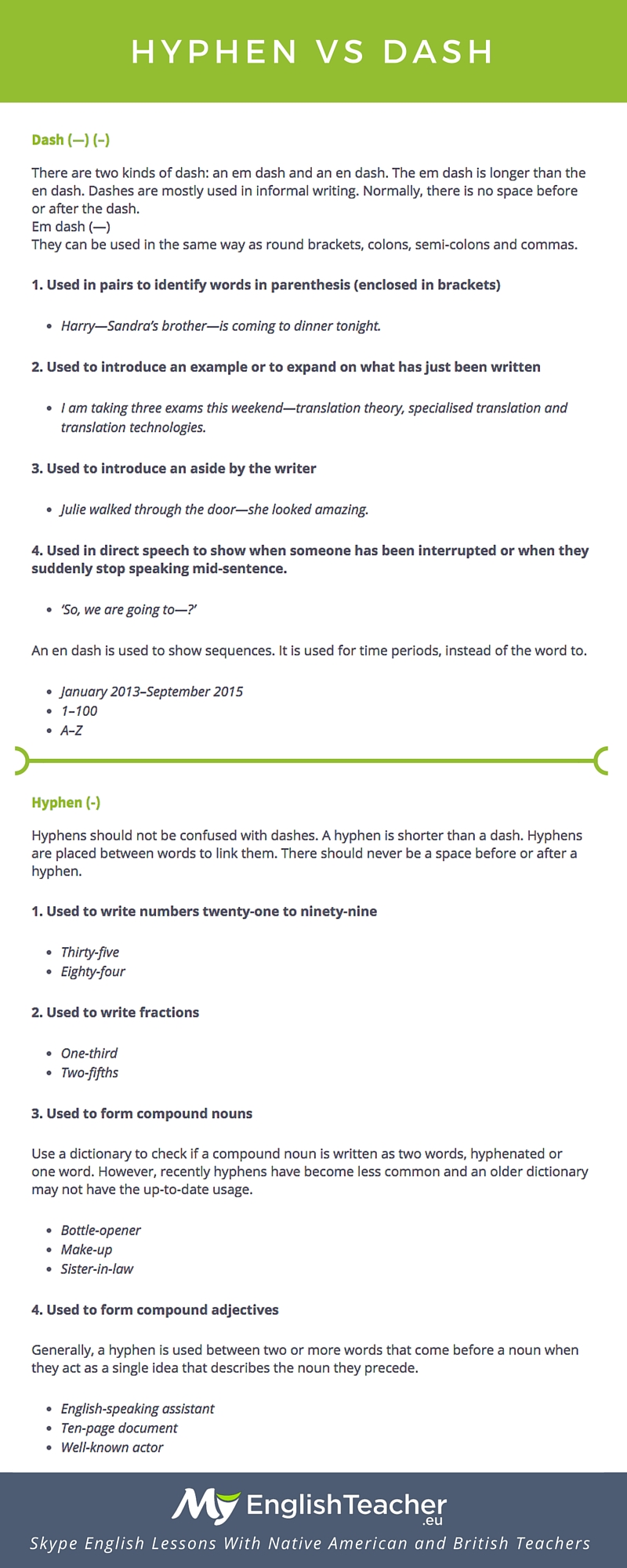
Recommended for you:
Punctuation Marks – Quotation Marks – Question Mark
Best English Grammar and Spelling Checkers Online
BEST E-Books to Learn English
10 Websites to learn and practice English Grammar
The differences between a hyphen and a dash are very subtle and often easily confused.
Hyphen
A hyphen joins two or more words together, such as double-barrelled names or compound words. There is no space between the hyphen and the words it is joining.
Some examples of double-barrelled names are:
- Forenames: Anne-Marie, Annie-May, James-Lee
- Surnames: Harding-Rolls, Bailey-Ray, Moore-Towers
Some examples of compound words are:
- Mother-in-law, warm-hearted, camera-ready, twenty-five, bad-tempered, carbon-neutral, custom-built, fifty-seven, ninety-two, well-advised, state-of-the-art, ex-girlfriend
PLEASE NOTE: Not all compound terms are written with a hyphen, many open (or spaced) compound terms are just separated with a space, such as
- car wash, printing press and quick learner.
Other closed (or solid) compound terms are simply written together as one word, without the space or hyphen, such as
- lifestyle, bookstore and notebook.
The rules behind which compound nouns, verbs or adjectives are hyphenated or not seem to be changing all the time through modern usage of the English language. Many words that used to be hyphenated have since dropped the hyphen to become a single word, such as
- email and nowadays.
The best way to find out when a word is or isn’t hyphenated would be to check a trusted dictionary.
One rule, that you can usually be certain of, is that the adverb ‘very’ and adverbs ending in ‘ly’ are not hyphenated.
- incorrect: a very-smart boy / the highly-educated girl
- correct: a friendly-looking lady / a family-run business (these are correct because the ‘ly’ words are not adverbs)
In some cases, hyphens can change the meaning of a sentence too, which may sometimes be very confusing:
- Could you help me with re-covering my sofa? (Putting a new cover on the sofa)
- Could you help me with recovering my sofa? (Getting the sofa back from someone who has borrowed or stolen it)
- Fayetteville has little-town charm (It has the distinct charm of a small town)
- Fayetteville has little town charm (It doesn’t have any charm at all)
- Denise has a concealed-weapons permit (She has a permit to carry concealed weapons)
- Denise has a concealed weapons permit (She has a hidden permit for weapons)
You should also use a hyphen when a number is used to form part of an adjectival compound:
- I am going to attempt to break the 100-metre sprint record
- I love reading the books of most nineteenth-century novelists
It is possible to modify a sentence so that you can choose whether you do or do not use the hyphen:
- We have a five-year-old child
- Our child is five years old
Dash
A dash has a space on either side of it and is used to separate supplementary or linked statements. It is sometimes seen as quite similar to the way semi-colons (;), colons (:), ellipses(…) and parentheses (different types of brackets) are used. In academic or formal writing, when you add parenthetical statements or comments, you should use brackets and not the dash, as the dash is seen to be more informal.
Dashes are generally used to add more emphasis, an abrupt change of thought or an interruption. They can prove useful when a writer wishes to make the tone subtly stronger, here are some examples:
- I take care of our children; you spend all our money
- I take care of our children – you spend all our money
- If you could just … oh, forget it.
- If you could just – oh, forget it.
- You are the one, the only one, I can trust.
- You are the one – the only one – I can trust.
I hope this makes your understanding of the hyphen and dash a bit clearer!
Please note: This is not an exhaustive list of all the uses of hyphens and dashes, nor does it show all the different types of dashes used, only the most common or widely used. Happy Learning!


























